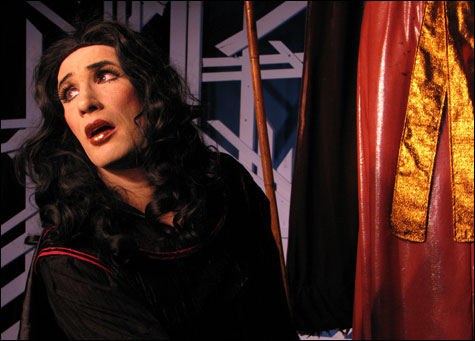
MILDRED PIERCE? Well, Landry as Medea does look like Joan Crawford, but that’s as far as the parallel goes. |
My dad used to tell a joke connecting the author of Medea to a pair of pants. The Italian-inflected punch line: “Euripides?” “You menda dese.” By and large, Greek tragedy and comedy are, well, opposite sides of the mask. But don’t tell that to proponents of the Theater of the Ridiculous, as exemplified by the late Charles Ludlam and his acolyte turned diva. Ryan Landry, spiritual leader of the Gold Dust Orphans, first channeled his inner Joan Crawford into the vengeful heroine of Medea in an al fresco production on his porch in Provincetown. Later, in the Orphans’ Boston infancy, he revived it at the low-rent Dollhouse Theatre. Now, the terrifying tale of the sorceress scorned is back in a new production (at Machine through March 15) whose budget rivals Landry’s supersized acting — inevitably losing, but not without a lot of drums, lightning, and special effects that include a pair of echoing ghouls on sticks, a cloud chariot with a mind of its own, and a curdling barrage of body fluids hitting the wall of a plexiglass booth.
Of course, the myth of Medea was over the top before Ludlam and Landry got hold of it. Having already betrayed her family and dismembered a few relatives to help inamorato Jason in his pursuit of the Golden Fleece, she has wound up in exile in Korinth with her hottie Argonaut — who, after fathering a couple of kids, ditches her for the daughter of Kreon, the king. But the formidable Medea isn’t taking it lying down. A witch descended from the sun god Helios, she has a lethal trick or two up her sleeve — or, at Machine, where Landry has a shower scene followed by a naked strut, up her tattoo. Eventually she gets a sleeve — two shimmering green ones set against a bodice of camouflage, thanks to the goosed-up budget that also covers a cascade of jet-black curls, Jesus sandals, boxing gloves, and two new outfits for the second slim act. (Even with an intermission, Medea clocks in at under an hour and a half.)

Landry’s Medea is built on the chassis of Ludlam’s 1984 riff on Euripides, which was published in The Complete Plays of Charles Ludlam —much of Landry’s script is taken word for word from Ludlam’s, though the latter is not credited. Landry, of course, has added his own soupçons both textual and visual, and they tend to be the funniest things in the show — especially the portrayal of one of Jason and Medea’s doomed sons as a bonneted infant in a bassinet, with a large human head and a doll’s body. Believe me, to judge by his apprehensive expressions, this kid is anticipating something a lot worse than coat hangers — even if his pissed-off mom does look like the star of Mildred Pierce. And he gets it, winding up as a sort of Day of the Dead barbecue special dangling over a cauldron as his murderous mom, a mauve scarf fluttering behind her, mounts a Jet Blue getaway chariot.
Landry’s Medea is a glowering, ghoulish grotesque made up like Callas and shooting optic daggers. She can be coquettish when she needs to be, but by and large this is a pull-out-all-the-stops holiday at Camp Ryan. Under James P. Byrne’s direction, a couple of the other Orphans manage to be as funny while remaining tethered to reality. The usually glam Afrodite, done up in rags, suspicion, and a stoop, is a trembling stitch as the Nurse. And Scott Martino, in golden helmet and jock strap, delivers the Messenger’s visceral account of the melting of Jason’s bride and her dad with chilling efficacy, allowing a tacky dumb-show re-enactment to supply the hilarity. As for Mark Leahy’s Jason, he strikes some manly poses but mostly plays it straight. At glorious overacting, Landry Golden Fleeces him.